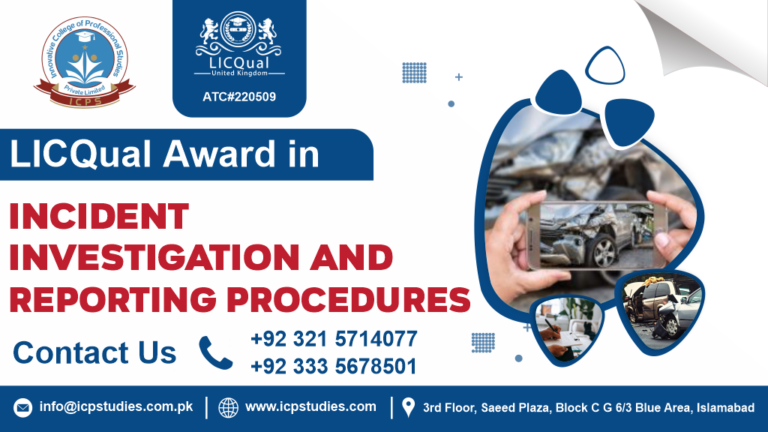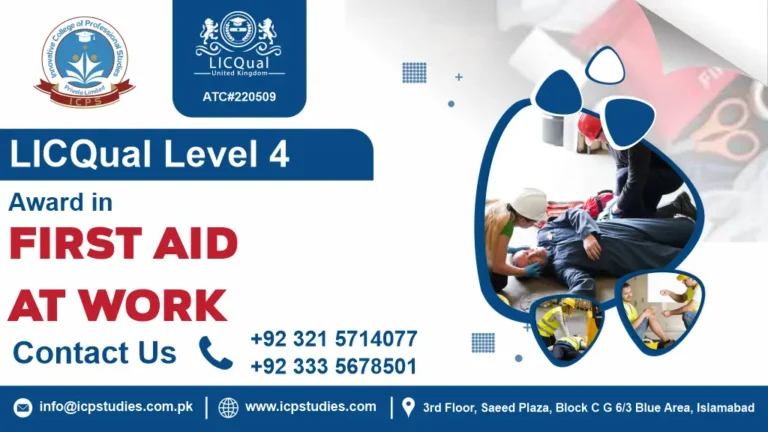At LICQual, we understand the importance of rigorous training and certification in accident scene preservation. Our program is designed by industry experts and follows international standards to ensure that you receive the highest quality education and training. With LICQual, you can trust that you’re getting the knowledge and skills you need to excel in this critical field.
- Comprehensive Curriculum: Our award-winning curriculum covers all aspects of accident scene preservation and evidence collection, from initial response protocols to advanced techniques for documenting and preserving evidence.
- Hands-On Training: You’ll have the opportunity to put your skills into practice with hands-on training exercises and simulations. Our experienced instructors will guide you every step of the way, ensuring that you’re confident and competent in real-world scenarios.
- Industry Recognition: The LICQual Award is recognized and respected by industry professionals and employers worldwide. With this certification on your resume, you’ll stand out from the crowd and open doors to new career opportunities.
- Commitment to Excellence: LICQual is committed to excellence in everything we do. We continuously update our curriculum to reflect the latest advancements in accident investigation and evidence collection, ensuring that you’re always at the forefront of the field.
Don’t miss out on the opportunity to enhance your career and make a positive impact on workplace safety. Enroll now in LICQual Award today and take the first step toward becoming a trusted expert in this critical field. Your future success starts here!
All About Award in Accident Scene Preservation and Evidence Collection
Course Overview
The LICQual Award in Accident Scene Preservation and Evidence Collection is a prestigious certification program designed to equip individuals with the knowledge, skills, and expertise necessary to effectively preserve accident scenes and collect crucial evidence for investigations. Developed by LICQual, a recognized leader in vocational qualifications and training, this award provides comprehensive training in accident investigation protocols, evidence documentation, and preservation techniques.
Accident Scene Management: Understanding the principles and protocols for managing accident scenes, including securing the area, controlling access, and ensuring the safety of responders and bystanders.
Evidence Collection Techniques: Learning the proper methods for collecting and documenting various types of evidence, including physical evidence such as debris, vehicle damage, and biological samples, as well as digital evidence from vehicles, surveillance cameras, and other sources.
Documentation and Recording: Mastering the art of accurate and detailed documentation, including note-taking, photography, sketching, and video recording, to create a comprehensive record of the accident scene and the evidence collected.
Overall, the LICQual Award in Accident Scene Preservation and Evidence Collection is essential for professionals involved in accident investigation, law enforcement, forensic science, insurance, and safety management. By obtaining this certification, individuals demonstrate their commitment to excellence and their ability to contribute effectively to accident investigations and the pursuit of justice.
Study Units
Learning Outcomes
- Introduction to Accident Scene Preservation and Evidence Collection:
- Understand the fundamental principles and importance of accident scene preservation and evidence collection.
- Identify the key objectives and challenges associated with preserving accident scenes and collecting evidence.
- Appreciate the significance of accurate and thorough documentation in the investigative process.
- Types and Significance of Evidence in Accident Investigations:
- Recognize the various types of evidence commonly encountered in accident investigations, including physical, biological, and digital evidence.
- Understand the significance of different types of evidence in establishing causation, liability, and contributing factors in accidents.
- Evaluate the relevance and reliability of different types of evidence in the context of specific accident scenarios.
- The Role of Chain of Custody in Evidence Integrity:
- Define the concept of chain of custody and its importance in maintaining the integrity and admissibility of evidence.
- Identify the key components of a chain of custody record and understand the responsibilities of custodians in preserving evidence integrity.
- Implement proper chain of custody procedures to ensure the traceability and accountability of evidence throughout the investigative process.
- Accident Scene Assessment and Hazard Identification:
- Conduct thorough assessments of accident scenes to identify potential hazards, safety risks, and environmental factors.
- Apply systematic approaches and protocols for hazard identification and risk assessment in accident scenes.
- Implement appropriate control measures to mitigate hazards and ensure the safety of responders and bystanders at accident scenes.
- Techniques for Physical Evidence Collection and Preservation:
- Master a range of techniques for collecting physical evidence at accident scenes, including debris, tire marks, and vehicle damage.
- Understand the principles of evidence preservation and implement proper techniques for packaging, labeling, and securing physical evidence.
- Minimize the risk of contamination and degradation of physical evidence through careful handling and storage procedures.
- Documentation and Sketching of Accident Scenes:
- Develop skills in documenting accident scenes through accurate note-taking, sketching, and mapping techniques.
- Create detailed and comprehensive records of accident scenes, including the placement of vehicles, landmarks, and evidence markers.
- Communicate effectively with stakeholders and investigators by producing clear and informative accident scene documentation.
- Photography and Videography in Evidence Collection:
- Utilize photography and videography techniques to capture detailed images and videos of accident scenes and evidence.
- Understand the principles of composition, lighting, and perspective to produce high-quality visual documentation.
- Apply digital imaging technology and software tools to enhance and analyze photographic evidence in accident investigations.
- Digital Evidence and Data Preservation:
- Identify sources of digital evidence commonly encountered in accident investigations, including vehicle data recorders, surveillance footage, and mobile devices.
- Implement proper procedures for the acquisition, preservation, and analysis of digital evidence to ensure its integrity and admissibility.
- Navigate legal and ethical considerations surrounding the collection and use of digital evidence in accident investigations.
Admission Criteria
Entry Requirements for the LICQual Award in Accident Scene Preservation and Evidence Collection:
- Educational Qualifications:
- A minimum of a high school diploma or equivalent qualification is required for enrollment in the course.
- Candidates with higher education qualifications or relevant certifications in fields such as law enforcement, forensic science, or safety management may receive preference during the selection process.
- Language Proficiency:
- Proficiency in the language of instruction (usually English) is essential to comprehend course materials, participate in discussions, and complete assessments effectively.
- Applicants may be required to provide proof of language proficiency through standardized tests or other recognized assessments if English is not their native language.
- Professional Experience:
- While prior experience in accident investigation, law enforcement, forensic science, or related fields is not mandatory, candidates with relevant work experience may have a competitive advantage during the application process.
- Applicants should demonstrate a keen interest in accident scene preservation and evidence collection, along with a commitment to professional development and continuous learning in this field.
- Technical Skills:
- Basic computer literacy and proficiency in using common software applications (e.g., word processing, spreadsheet, and presentation software) are beneficial for accessing course materials, participating in online discussions, and completing assignments.
- Familiarity with digital photography and videography equipment, as well as image editing software, may be advantageous for certain modules of the course.
- Legal and Ethical Requirements:
- Candidates must adhere to legal and ethical standards governing accident investigation and evidence collection, including confidentiality, privacy, and professional conduct.
- Applicants with a clean criminal record and a commitment to upholding ethical principles in their professional practice are preferred for admission to the course.
- Other Considerations:
- Applicants may be required to undergo a selection process, which may include an interview, written assessment, or review of academic transcripts and professional qualifications.
- Some institutions offering the LICQual Award in Accident Scene Preservation and Evidence Collection may have additional entry requirements or prerequisites, which candidates should carefully review before applying.
Overall, while specific entry requirements may vary depending on the institution delivering the course, prospective candidates should possess a combination of educational qualifications, language proficiency, professional experience, technical skills, and adherence to legal and ethical standards to be eligible for enrollment in the program
Ideal Candidate
- Law Enforcement Professionals:
- Police officers, detectives, and investigators responsible for conducting accident investigations and collecting evidence at accident scenes.
- Traffic enforcement officers and highway patrol personnel involved in documenting and analyzing traffic accidents.
- Forensic Scientists and Technicians:
- Forensic experts specializing in accident reconstruction, evidence analysis, and crime scene processing.
- Forensic technicians tasked with collecting, documenting, and preserving physical and digital evidence for forensic analysis.
- Safety and Health Professionals:
- Safety managers, inspectors, and consultants working in industries such as transportation, construction, manufacturing, and healthcare.
- Occupational health and safety specialists responsible for investigating workplace accidents and implementing preventive measures.
- Insurance Claims Adjusters and Investigators:
- Claims adjusters and investigators assessing insurance claims related to accidents, injuries, and property damage.
- Insurance fraud investigators tasked with verifying the validity of claims and detecting fraudulent activities.
- Legal Professionals and Prosecutors:
- Attorneys, paralegals, and legal assistants involved in litigating personal injury cases, wrongful death claims, and civil lawsuits stemming from accidents.
- Prosecutors and legal advocates seeking to present compelling evidence in criminal cases involving vehicular accidents and traffic violations.
- Emergency Response Personnel:
- Firefighters, paramedics, and emergency medical technicians (EMTs) involved in providing emergency medical care and extrication at accident scenes.
- Emergency responders trained to assess hazards, secure accident scenes, and coordinate with other agencies during rescue operations.
- Safety Consultants and Risk Managers:
- Safety consultants offering expertise in accident prevention, risk assessment, and regulatory compliance to businesses and organizations.
- Risk managers responsible for identifying, mitigating, and managing risks associated with accidents, injuries, and property damage.
- Students and Aspiring Professionals:
- Students pursuing degrees or certifications in fields such as criminal justice, forensic science, safety management, or law enforcement.
- Aspiring professionals seeking to enter careers in accident investigation, evidence collection, and forensic analysis.
Overall, the LICQual Award in Accident Scene Preservation and Evidence Collection is designed for a diverse range of professionals involved in accident investigation, evidence collection, and forensic analysis across various industries and sectors. Whether you’re a seasoned law enforcement officer, a forensic scientist, an insurance claims adjuster, or an aspiring safety consultant, this course equips you with the essential knowledge and skills to excel in your field and make a meaningful impact in accident investigations and evidence preservation.
FAQs about Award in Accident Scene Preservation and Evidence Collection







